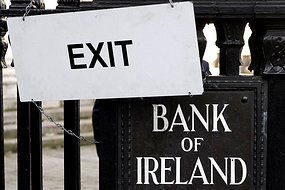Irish govt bows to EU bailout
After weeks of denying it needed a financial rescue, the Irish government this morning agreed to a humiliating bailout to keep its banking system solvent.
Ireland joins Greece as the second EU country to apply for a rescue.
The pressure to accept a bailout came from EU officials who were concerned that if Ireland did not grab the lifeline its problems could spread to other weak EU economies.
For the Irish government a strategy of face saving spin was never going to head off a humiliating rescue.
Even now, Ireland's prime minister Brian Cowen is still avoiding the word "bailout", preferring to call it assistance.
But no matter the wording, Mr Cowen's sombre tone summed up the crisis facing the Irish economy.
"I can confirm that the government has today decided that Ireland apply for financial assistance at the European Union," he said.
"The request of the government was transmitted to the European authorities this evening. European authorities have agreed to our request."
The bailout comes only days after the European Union and the IMF sent their own auditors to Dublin for a forensic examination of the government's books, including the viability of its commitment to rescue banks.
The package will be just shy of 100 billion euros and, according to prime minister Cowen, the negotiations will be finalised in the next few weeks.
"Put simply, the Irish banks will become significantly smaller than they have been in the past so that they can gradually be brought to stand on their own feet once more," he explained.
Ireland is already suffering from high unemployment and government spending cuts after the real estate bubble burst with devastating consequences.
Brian Cowen says the bailout bill will have to be paid, and the buck stops with Irish taxpayers.
"The government has to increase our taxes and reduce our spending to levels we can afford. In order to help Ireland complete these essential tasks and to safeguard the stability of the Euro area, we will receive funding which we will repay over time," he added.
"The next step in the process will be the publication of the government's four year plan to solve the problems in the public finances. It is the responsibility of the government to prepare and publish that plan."
The prospect of even harder times for the Irish people caused protests outside the Irish parliament today.
Ireland's main Sunday newspaper ran photos of every cabinet minister with the headline: "You lied, you have let us down. For Ireland's sake, go now."
The deputy leader of the Fine Gael party James Reilly did not hold back.
"It is a dark day and very disappointing for me as an Irishman, for my party and for my people and the people of the country," he railed.
"I believe that this government has brought us to this point through failures to tell the truth over the last week and failures to bring in policies that were realistic and we are here today because of that failure."
However, prime minister Cowen was rejecting calls to resign, as he took some tough and personal questions from journalists.
"I would like to ask you if you yourself have felt a little humiliated or ashamed that Ireland has got into this situation, how much of the culpability for Ireland getting into this situation you take on your shoulders and if you've thought about packing it in?" asked one journalist.
"Well, first of all to say obviously it is a difficult time for the country but in relation to my own position, I have made it very clear that at this time this government is determined to fulfil its duty and won't be deflected from the duty that it has to discharge," Mr Cowen replied.
Today's announcement came on a Sunday, to pre-empt the opening of share markets in Europe and the United States.
Stuart Thomson of Inglis Asset Management says global investors were nervous about a potential Irish debt default.
"I don't think they [the Irish government] had much choice. They were borrowing more than their annual GDP from the European Central Bank (ECB), and when the European Central Bank deemed this unnecessary or unwilling to provide that money, then they were left with little choice but to apply to the European authorities for more transfers," he explained.
Mr Thomson says, while the bailout will stabilise Ireland for now, other weak economies in Europe remain exposed.
"Portuguese and Spanish banks and even Greek banks are still borrowing too much money from the ECB, and it will look to wean these banks off its borrowings before it can raise interest rates," he added.
The only positive news for some people in Ireland is that the resulting austerity measures will not include raising the corporate tax rate of 12.5 per cent which has attracted businesses from around the globe.
However, the Irish government knows that whatever other measures it takes, the days of the booming economy once known as the Celtic Tiger are over.
